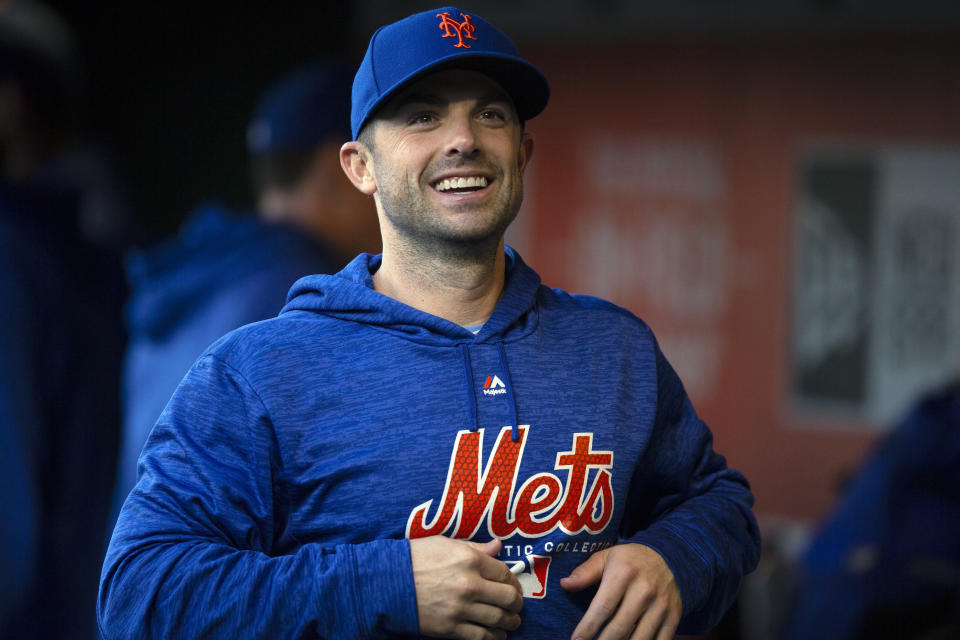David Wright will be activated by Mets for one final homestand before likely retiring
David Wright will make his much-anticipated return to games at Citi Field later this month — but it’s also what the New York Mets star is saying will likely be his final farewell.
The team announced Thursday that Wright will be activated Sept. 25 when the Mets play the Atlanta Braves and start at third base Sept. 29 against the Miami Marlins, the team’s final Saturday home game of the season.
Wright said Thursday he’s looking at that game as the final game of his career too. This was his answer when asked if he thought he’d play again after this:
“The way I feel right now and from everything the doctors have told me, there’s not going to be any improvement,” Wright said. “So I don’t see that as a possibility.”
An emotional David Wright confirms the Mets' final homestand this season will be his last.
(via @SNYtv)pic.twitter.com/Onl1FrreJO
— Yahoo Sports (@YahooSports) September 13, 2018
Wright, 35, hasn’t played since May 2016 and played only 75 games since 2015 while he dealt with back, shoulder and neck problems. During the announcement, Wright teared up and avoided the word “retire” while addressing his teammates and Mets fans specifically.
“It’s truly been an honor to take the field with you, and serve as your captain,” he said. “To the fans, words can’t address my gratitude.”
Fans hoped he would return far earlier this season, but he experienced setbacks in spring training following a September 2017 surgery to repair his right rotator cuff and an October surgery on his lower back.
In 12 minor league games in St. Lucie and Triple-A Las Vegas last month, he hit for a .171/.209/.195 slash line. In 7 for 41 with a double, two RBIs, two walks and four runs scored. Wright participated in a simulated game at Citi Field last week.

David Wright’s on-going health issues
Wright, a seven-time all-star, is the face of the New York Mets with two Gold Gloves, two Silver Slugger awards and an otherwise decorated career at the hot corner while the team struggled before a World Series appearance in 2015.
In his first seven seasons, he avoided the disabled list, but has been a mainstay on it in the years since. He averaged 156 games a season from 2005-2010 and 126 games from 2011-2014.
In May 2015 he was diagnosed with spinal stenosis, a narrowing of the spinal column, after missing time with a right hamstring sprain. He began extensive hours-long pre-game routines simply to get on the field every day.
In June 2016 he underwent neck surgery to repair a herniated disc and in February 2017 he was diagnosed with right shoulder impingement, forcing him to miss Opening Day and the rest of the season.
The David Wright decision could cost the Mets millions
Both Wright and Mets COO Jeff Wilpon danced around saying 100 percent that he was retiring during Thursday’s press conference.
Wright indicated a few times that his body isn’t capable of playing big-league baseball anymore. Wilpon started the press conference by saying, “his body is still preventing him from making it back.” Later, Wilpon said that Wright isn’t technically retiring but that he medically unable to play, as James Wagner of the New York Times noted:
Wilpon said that Wright isn’t technically retiring. Wright is medically unable to play anymore. His final week is essentially ceremonial.
— James Wagner (@ByJamesWagner) September 13, 2018
A lot of this dance, as you can imagine is related to money. Wright is still owed $15 million in 2019 and $12 million in 2020 as part of the eight-year, $138 million deal he signed in November 2012. If he officially retires, he wouldn’t get the money. But if he plays, it hinders the Mets’ insurance policy against his contract.
After Wright signed the $138 million deal, the Mets took out a policy that would pay 75 percent of Wright’s salary if he misses more than 60 games. By activating Wright, the Mets will be on the hook for more of his salary this year and next year — since the 60-game clock on the policy would reset. The decision to activate Wright will, in essence, cost the team millions of dollars.
“The decision has nothing to do with insurance or finances,” Wilpon said Thursday. “It’s about David’s long-term health, his quality of life and desire to get back on the field. Giving him the chance to get back on the field is the right thing to do for David, our organization and the fans.”
More from Yahoo Sports:
• Naomi Osaka reveals what Serena told her while fans booed at U.S. Open
• Mayor lifts Nike ban in Louisiana town following outcry
• Jags coach gets too ‘pissed off’ to watch Super Bowl
• Antonio Brown apologizes to ESPN reporter after sending threatening tweet



